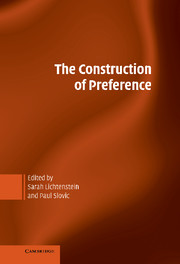Book contents
- Frontmatter
- Contents
- Contributors
- Preface
- Acknowledgments
- I INTRODUCTION
- II PREFERENCE REVERSALS
- III PSYCHOLOGICAL THEORIES OF PREFERENCE REVERSALS
- IV EVIDENCE FOR PREFERENCE CONSTRUCTION
- V THEORIES OF PREFERENCE CONSTRUCTION
- VI AFFECT AND REASON
- 22 Reason-Based Choice
- 23 The Affect Heuristic
- 24 The Functions of Affect in the Construction of Preferences
- 25 Mere Exposure: A Gateway to the Subliminal
- 26 Introspecting About Reasons Can Reduce Post-Choice Satisfaction
- VII MISWANTING
- VIII CONTINGENT VALUATION
- IX PREFERENCE MANAGEMENT
- References
- Index
22 - Reason-Based Choice
Published online by Cambridge University Press: 05 June 2012
- Frontmatter
- Contents
- Contributors
- Preface
- Acknowledgments
- I INTRODUCTION
- II PREFERENCE REVERSALS
- III PSYCHOLOGICAL THEORIES OF PREFERENCE REVERSALS
- IV EVIDENCE FOR PREFERENCE CONSTRUCTION
- V THEORIES OF PREFERENCE CONSTRUCTION
- VI AFFECT AND REASON
- 22 Reason-Based Choice
- 23 The Affect Heuristic
- 24 The Functions of Affect in the Construction of Preferences
- 25 Mere Exposure: A Gateway to the Subliminal
- 26 Introspecting About Reasons Can Reduce Post-Choice Satisfaction
- VII MISWANTING
- VIII CONTINGENT VALUATION
- IX PREFERENCE MANAGEMENT
- References
- Index
Summary
The result is that peculiar feeling of inward unrest known as indecision. Fortunately it is too familiar to need description, for to describe it would be impossible. As long as it lasts, with the various objects before the attention, we are said to deliberate; and when finally the original suggestion either prevails and makes the movement take place, or gets definitively quenched by its antagonists, we are said to decide … in favor of one or the other course. The reinforcing and inhibiting ideas meanwhile are termed the reasons or motives by which the decision is brought about.
– William James (1890/1981)My way is to divide half a sheet of paper by a line into two columns; writing over the one Pro, and over the other Con. Then, during three or four days' consideration, I put down under the different heads short hints of the different motives, that at different times occur to me for or against the measure. When I have thus got them all together in one view, I endeavor to estimate the respective weights … find at length where the balance lies…. And, though the weight of reasons cannot be taken with the precision of algebraic quantities, yet, when each is thus considered, separately and comparatively, and the whole matter lies before me, I think I can judge better, and am less liable to make a rash step; and in fact I have found great advantage for this kind of equation, in what may be called moral or prudential algebra.
– Benjamin Franklin, 1772 (cited by Bigelow, 1887)- Type
- Chapter
- Information
- The Construction of Preference , pp. 411 - 433Publisher: Cambridge University PressPrint publication year: 2006
- 3
- Cited by



